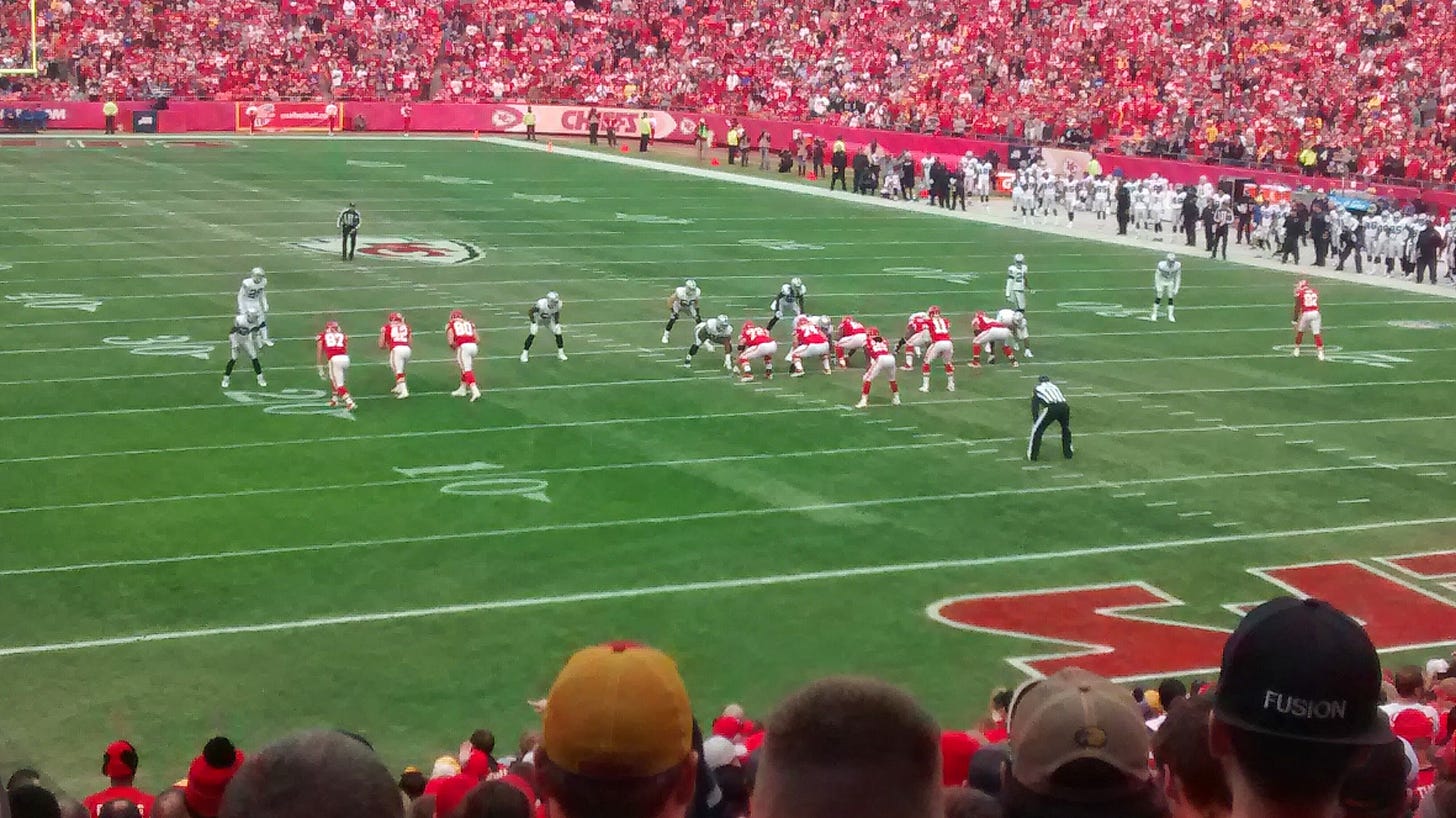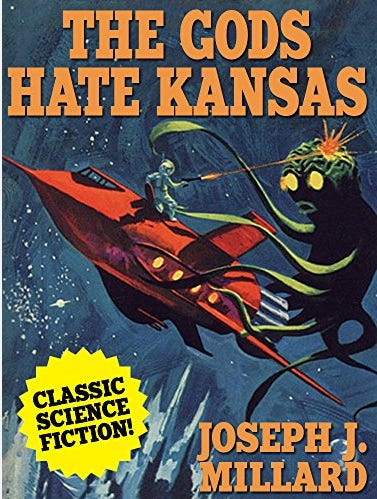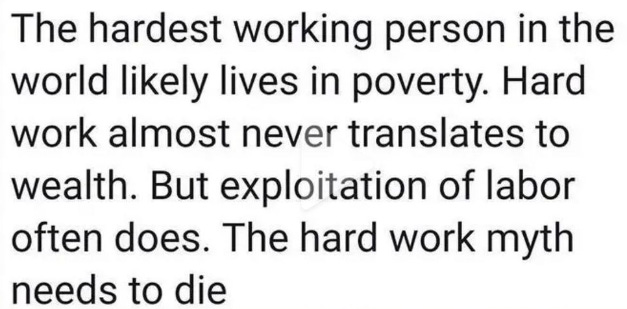The Evolution of a Kansas City Chiefs loss
Football, fan behavior through the years, and what it can help us learn about poverty
I’ve been a Kansas City Chiefs fan for quite a long time.
When I was a child, my Dad watched a lot of football. I can’t remember who his favorite team was, but I liked the team that carried my state’s name - even if I wasn’t fully invested in their performance or understood what it meant to be a fan of the Kansas City Chiefs.
Over time, I would learn. During most of my adult life, rooting for the Chiefs felt like a curse. We might have a good season, but never that good. We might make the playoffs, but never the Super Bowl.

Even the most dedicated fans carried the knowledge that their team just wasn’t quite good enough. They might be excited about a new player, or the way the season was going, but in fans’ hearts we knew that we were the “Choking Chiefs,” and that given a critical moment, the team would find a way to fail.
This malaise settled over every season. When the Chiefs invariably lost in the playoffs - by a point to the Dolphins, or a rout by the Bills, the Broncos, the Colts, Ravens, and on and on - fans might be sad, but they certainly weren’t surprised. At the first moment of trouble, the entire Chiefs Kingdom seemingly sighed and shrugged in knowing resignation - immediately losing faith and saying aloud the things we already knew.
We were, after all, losers. Not all the time. But when it mattered the most, when faced with difficulty we would always fail. Losing is what it meant to be a Chiefs fan. Most of my friends accepted the sad realization that the Chiefs would never win a Super Bowl in their lifetimes.
We were still steadfast fans, and accepted our lot in life. But we began to think this book wasn’t fiction at all.
The disposition and outlook of your average Chiefs fan is quite different these days.
Turns out a solid coach and a handful of star players can really turn things around. Not just the team’s win/loss record or its likelihood of success in the playoffs - but mostly the spirit of its fan base.
On Sept. 7, the reigning Super Bowl Champion Chiefs lost 21-20 to the somewhat improved but still perennial punching bag Detroit Lions, who did the unthinkable by beating Patrick Mahomes in Arrowhead Stadium.
For today’s Chiefs fans, however, this season opening loss wasn’t a sign of what’s to come, nor was it a portent of calamity in Kansas City. In fact, it seems not a single Chiefs fan has lost heart.
It was, to watch the reaction unfold online, simply a bump in the road. Once all the team’s players are healthy, after a few simple offensive adjustments, and when the receiving corps has more experience with our once-in-an-era quarterback, our team will return to its Super Bowl glory.
Because we are, after all, winners. And winners don’t quit and winners don’t lose. Faced with difficulty, when it matters the most, winners step up to the challenge and do whatever they must to secure victory.
And whether it’s football or life, that change in orientation, that change in belief, is the incredible difference a history of losing, or winning, can have on a person’s spirit and psyche.
It has always bothered me when people for whom life has seemingly gone mostly pretty well can’t see beyond themselves to consider that life might not be so filled with winning for everyone.
I see it in Topeka every year, when people who’ve never wanted for much make disparaging and degrading comments about people whose lives contain experiences most of us could never comprehend. We will bend over backwards to create ways to give corporations money and call it an investment - but a similar investment in people will be sneeringly called a handout.
(And here is just one example - oh wait here’s another - of how the legislature uses your tax dollars to help itself or its favorite people).
I also hear people who inherited their father’s business and never once in their lives had to concern themselves with how they’d make their way in life preach about pulling yourself up by your bootstraps. And when someone whose only brush with poverty can be summarized in the jokes they tell about the poor diet they experienced in college tries to explain how another’s problems would be solved if they’d just try harder, or get a better job.
Yet, I shouldn’t be surprised. Here in Chiefs Kingdom, we can’t seem to remember our plight in the 1980s, 90s, 2000s, and 2010s. In those days, we anticipated loss, girded ourselves for it, even when things were looking up. The default position of a Chiefs fan was that things would go wrong, we’d lose, and it’s best to not get our hopes up too much.
Now just a few years of consistent playoff victories and two Super Bowls later we’ve seemingly forgotten about all those dark years. Nowadays, our default position is that we will win. No matter how far behind we are, or how little time is left in the game. We will overcome any obstacle, and we expect and believe that it is our right to win.
For those who work in trying to mitigate the system failures that have exacerbated poverty, lack of medical care, food insecurity, and housing instability, there’s an understanding and recognition that poverty creates, and is, trauma. And we know that chronic poverty isn’t something that can just be willed away. Nor is it something that can be neatly and simply vanquished with a new job, or a newfound measure of discipline.
Because chronic, sustained poverty, like what we see with generational poverty, creates its own sort of hell. And the experiences of surviving that poverty and the trauma of it, creates a way of thinking in which one knows things will go wrong, that things won’t go the way we hope, that no matter how hard we try we’ll probably lose, and that it’s best to not get our hopes up too much.
Poverty, at its core, pushes people into a form of survival mode that interferes with the ability to imagine a world in which they might flourish - a world we know and can see exists for others but seems unreachable to us.
That’s not to say that people can’t, or don’t, find their way out of poverty. They do - but the doing so is exceptional, not the norm, and we need to stop treating it as such. When someone claws their way out of poverty, they are swimming against the current of systems that work against them, and quite often, a family history that has shaped their navigation of the world. We should celebrate and work to replicate these examples, not use them to support a false narrative that it’s so easy anyone can do it.
Most of the people sitting around tables making decisions for everyone don’t share those experiences or feelings. Many were born into wealth, or at least a stable middle class existence - with health insurance, dental insurance, money for braces, always functioning utilities, at least one and maybe two working vehicles, and a comfortable home with enough bedrooms for everyone. Even those who experienced poverty most likely did so only for a short while, and probably a generation or more ago - when family and community structures were more intact and functional than they are today, and when our economy was in a period of unparalleled growth.
For today’s 20-year-old Chiefs fan, winning is the norm. Winning will be expected, and these fans will never be able to understand the chronic pain and suffering endured by the generations before them.
Likewise, those who came of age during the unique economic realities that existed in America between the 1940-1980s have come to see many things as the norm that simply aren’t the reality today.
For example, in 1970, the median home price in the United States was $23,400; today it is $495,100. Meanwhile, the median household income in 1970 was $8,730 and in 2022 it was $74,580. So in 1970, the median home cost roughly 2.7 times the average household income; today it’s nearly 7 times the average household income. (Admittedly, housing and income figures will be quite a bit different for Kansas, but whether its housing, utilities, food, or transportation, the central point remains that everything we need to live has gone up at a much faster rate than our wages. And no, this didn’t just start when Biden was elected. Even if you desperately want to believe that, you really know it’s not true).
The realities of our time often shape our view of the world, but they don’t extend to an indefinite future. The world changes, and we are tasked to change with it.
After that loss to the Lions, I saw a good number of people sharing hopeful and optimistic thoughts about their team’s future. And I saw it from people who not too long ago also talked about the painful emotional toll of supporting a team that never could find a way to win the big games.
I get it. Winning sure feels a lot better than losing - and it’s nice to bask in this winning attitude while forgetting about the weight of all those years that we didn’t.
But there was a time for Chiefs fans when a season-opening loss at home to a team you were supposed to beat would’ve meant the season was pretty much over before it begun.
Today, it’s just a minor setback on our road to the Super Bowl.
I guess that’s just what winning - and losing - can do to a person.







Another good read. Jason. Growing up in the 50's, 1st TV in early 60's my Dad was in charge 2 Brothers and I were Chief fans, but Dad was a Dallas Cowboys fan how could anybody not be for America's team? If Dad was still here (101) I think he would be a Cowboys fan, & we would still be watching them on his TV,,
Insightful comments, Jason; you're touching on such fundamentals of Psych 101 as group think (we go along with crowds, adjusting our beliefs to what seems to be the accepted norm), recency bias (we think that whatever is currently the case is, in fact, the baseline, and contrary examples from the past are disregarded), and more. You're not just a fine writer; you're an educator, sir.